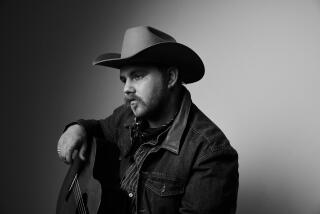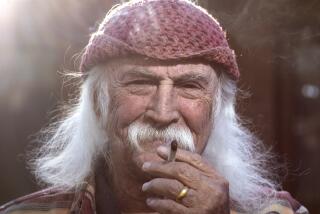Puckering up, blowing listeners away
- Share via
“Tumbling Tumbleweeds” floated from whistler Steve Herbst’s puckered lips last week as he stood over the Sons of the Pioneers star on Hollywood Boulevard.
Most passersby looked around, searching for the speakers they thought the music -- from “Cats” tunes to Stevie Wonder hits -- was coming from. A boy with a blond mullet stood at a nearby jewelry cart, where his mother was perusing the baubles. He stared, mouth agape at Herbst’s subtly puffing cheeks.
For the record:
12:00 a.m. April 22, 2004 For The Record
Los Angeles Times Thursday April 22, 2004 Home Edition Main News Part A Page 2 National Desk 2 inches; 69 words Type of Material: Correction
Whistler on TV -- An article in Saturday’s Calendar about whistler Steve Herbst said he had appeared on “The Tonight Show.” He was on the “Today” show. The article also said that fellow whistler George Oldfield didn’t think Herbst would ever be called a musician. Actually, he said that he didn’t think he himself would ever be called a musician but that Herbst had made strides in that direction.
Herbst had chosen the Pioneer star for his whistling exhibition for a reason. Three weeks ago, he performed at Lincoln Center in New York, where he whistled “Home on the Range” and “Streets of Laredo,” two tunes popularized by Roy Rogers’ backup band.
The former International Whistlers Competition Grand Champion and current whistling Entertainer of the Year has appeared on the “Tonight Show” and has whistled for TV commercials. But it’s live performances -- whether at Lincoln Center, in a small New York bar or here on Hollywood Boulevard -- that have special appeal for Herbst.
“Do I love making commercials where people don’t know who I am?” he asked earlier over his extra-crispy potatoes at a nearby Mel’s Diner. “Of course I do, it’s a paycheck. But what is most exciting is entertaining people, connecting with them.”
And though no one this day directly approached Herbst -- best known in the whistling world for his renditions of Liszt’s “Hungarian Rhapsody No. 2” and “Danny Boy” by Fred E. Weatherly -- during his impromptu performance on the boulevard, a connection was evident in the smiles drifting over faces as people caught snatches of tunes amid the blare of honking cars and roaring buses.
The New York City resident was visiting Los Angeles to tape an appearance on “The Joan Quinn Profiles,” a cable talk show that will air Monday. He also is preparing for the upcoming 31st International Whistlers Competition, which will be held in Louisburg, N.C., starting next week.
During the drive from his hotel to Hollywood and Highland, Herbst said, he spent his time practicing for the competition. . In the last competition he whistled “Blue Rondo a la Turk” by Dave Brubeck and Bach’s “Brandenburg Concerto No. 2.”
Herbst said he can usually whistle about 30 minutes before getting sore cheeks and a whistler’s ultimate horror: dry mouth -- though it was a dry mouth that helped Herbst find his calling.
As a boy Herbst would whistle on his way to school -- usually “Peter and the Wolf” by Sergei Prokofiev -- but solely for his own delight. “By the time I was 10, I had it mastered,” boasted Herbst, an instrumental whistler whose sounds mimic instruments rather than birds.
“What I would be doing as a little fella was mimicking what I heard,” he said of instruments representing Sonia the duck and Sasha the bird, “and trying to sound like an oboe, like a piccolo.”
The private performances became public when Herbst attended the University of Pennsylvania, where he was a member of the glee club. As Herbst tells it, the club’s director liked to whistle the intros rather than use a harmonica. One night the man was beset by a parched pucker. Herbst stepped in.
“If you had asked me at age 23 what I would like to do for the rest of my life, I would have said show business,” Herbst said. But instead of searching for fame, Herbst went into advertising.
He explained: “My father was reading the help-wanted ads in the New York Times and said, ‘Eh, this sounds like you.’ ”
It was the start of a 35-year career, which the 58-year-old Herbst recently ended in order to pursue whistling full time. It’s an uphill battle to get people to take his art seriously.
He related one upsetting experience he had in 1995 while appearing on the “Live With Regis and Kathie Lee” show alongside a mime, a drum corps member and a finger snapper. The performances were part of what was being billed as “Novelty Week.” Herbst said he was disappointed because the moniker made whistling seem “kind of on the bizarre side.”
For Herbst, whistling is no novelty, it’s simply music. And he’s amazing at it. Herbst said he has a three-octave range; compare that with the run-of-the-mill whistler, whose range is about half that.
“People tell me when they listen -- when they’re not looking -- they don’t hear it as whistling anymore,” Herbst said. “They hear it as music, as an instrument.”
Allen de Hart, founder and director of the International Whistling Convention, said he thinks whistling is slowly recarving a niche for itself. The music was popular in the late 19th and early 20th centuries, he said. Around 40 adult whistlers and about as many child and teen whistlers compete in North Carolina each year.
According to de Hart, the whistlers are only allowed to hold the grand champion title two years in a row. Then they are required to take at least a year off, he said. Herbst is in the running for the title, which he last held two years ago.
“He’s very tenacious, he sticks with it,” De Hart said of Herbst. “Some whistlers get discouraged and say, ‘Well, I can’t compete with those people.’ He thinks he’s good and he sticks with it.”
George Oldfield, a 67-year-old competitive whistler from Riverside, said that while he doesn’t think Herbst will ever be called a musician, he has already made strides in that area.
“I think Steve’s challenge that he’s made to himself has been a challenge to some other whistlers to step back into the arena and get involved in cooperatively and competitively moving whistling forward as an art form,” Oldfield said.
More to Read
The biggest entertainment stories
Get our big stories about Hollywood, film, television, music, arts, culture and more right in your inbox as soon as they publish.
You may occasionally receive promotional content from the Los Angeles Times.










